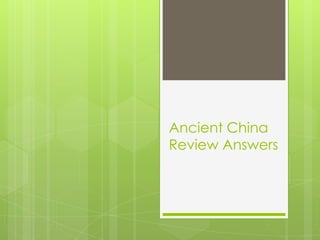
Ancient china review answers
- 2. Vocabulary 1. The Qin ruler Shi Huangdi followed Legalism and made it the official philosophy of his dynasty. 2. In Confucianism, filial piety or respect of elders was stressed as important in all relationships. 3. The Han dynasty set a bureaucracy, or system or departments in their government and held exams to fill government positions. 4. The trade on the Silk Road opened up China to outside influences and allowed their culture to spread or diffuse to other areas and vice versa.
- 3. Key Ideas 5. The Huang He or Yellow River helped Chinese civilization to develop by promoting agriculture with its rich silt making land more fertile. 6. The first writing was made by priests on oracle bones, this was the basis for later writing.
- 4. 7. Legalists believed in strict rules and complete obedience to the government, while Daoists stressed few rules and thought one should follow his or her own path. 8. The five relationships in Confucianism are: Ruler to subject husband to wife father to son elder brother to younger friend to friend
- 5. 9. High taxes, labor demands, persecution of Confucianists. 10. The departmentalized the government and made people take exams to get jobs. 11. China learned central Asian military methods, Buddhism, and western cultural ideas from trade on the Silk Road
- 6. 12. It was used for writing and cost so much less than silk that they could keep more detailed records for government. 13. The relationships that were stressed many focused on family and helped strengthen family structure. 14. Confucianists believed in fairness and learning and the tests made job searches more fair and allowed them to do well.
- 7. 15. This question is a matter of opinion but you need to include basic facts: Confucianism-stressed respect and fairness and a love of education Daoism-stressed finding one’s path and toleration, that we shouldn’t worry about government Legalism-stressed strict rules and punishments to keep people obedient
- 8. Map Questions 1. The western land of Chinas are most like Idaho and other western states. 2. Nebraska’ ms climate similar to the Northeast part of China.